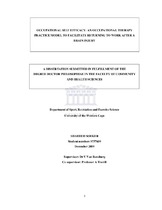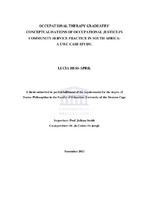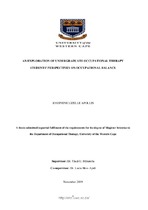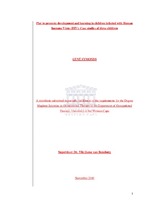| dc.contributor.advisor | van Rensburg, Viki | |
| dc.contributor.advisor | Travill, Andre | |
| dc.contributor.author | Soeker, Shaheed | |
| dc.contributor.other | Dept. of Sports, Recreation and Exercise Science | |
| dc.contributor.other | Faculty of Community and Health Sciences | |
| dc.date.accessioned | 2013-07-26T12:16:06Z | |
| dc.date.available | 2011/12/15 09:41 | |
| dc.date.available | 2011/12/15 | |
| dc.date.available | 2013-07-26T12:16:06Z | |
| dc.date.issued | 2010 | |
| dc.identifier.uri | http://hdl.handle.net/11394/1741 | |
| dc.description | Philosophiae Doctor - PhD | en_US |
| dc.description.abstract | This qualitative study explored and described the lived experience of people with brain injuries with regard to resuming their worker roles. Based on the results, an occupational therapy practice model to facilitate return to work was developed. The theoretical framework of occupational science with emphasis on occupational risk factors informed the study. The research design was a theory generative design based on a qualitative, phenomenological, explorative and descriptive research approach utilizing the methods of theory generation as advocated by Chinn and Kramer (1999), Walker and Avant (2005) and Dickoff, James and Wiedenbach (1968). | en_US |
| dc.language.iso | en | en_US |
| dc.publisher | University of the Western Cape | en_US |
| dc.subject | Brain injury | en_US |
| dc.subject | Human occupation | en_US |
| dc.subject | Work | en_US |
| dc.subject | Occupational science | en_US |
| dc.subject | Occupational therapy | en_US |
| dc.subject | Occupational deprivation | en_US |
| dc.subject | Theory generation | en_US |
| dc.subject | Vocational rehabilitation | en_US |
| dc.subject | Client-centred approach | en_US |
| dc.subject | Phenomenology | en_US |
| dc.title | Occupational self efficacy : an occupational therapy practice model to facilitate returning to work after a brain injury | en_US |
| dc.type | Thesis | en_US |
| dc.rights.holder | University of the Western Cape | en_US |
| dc.description.country | South Africa | |




